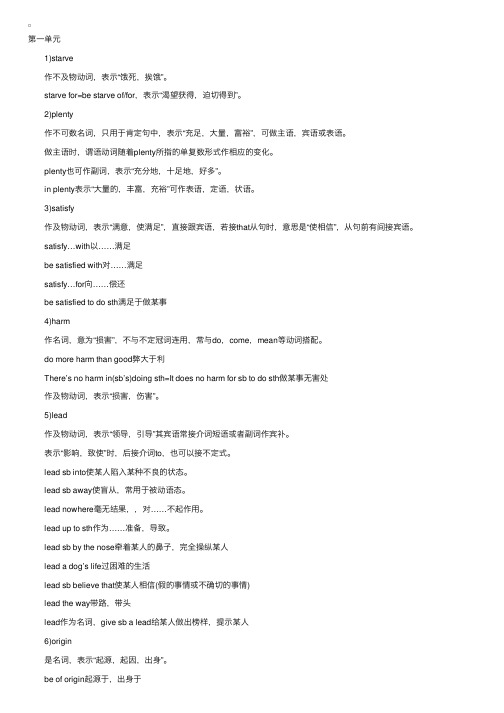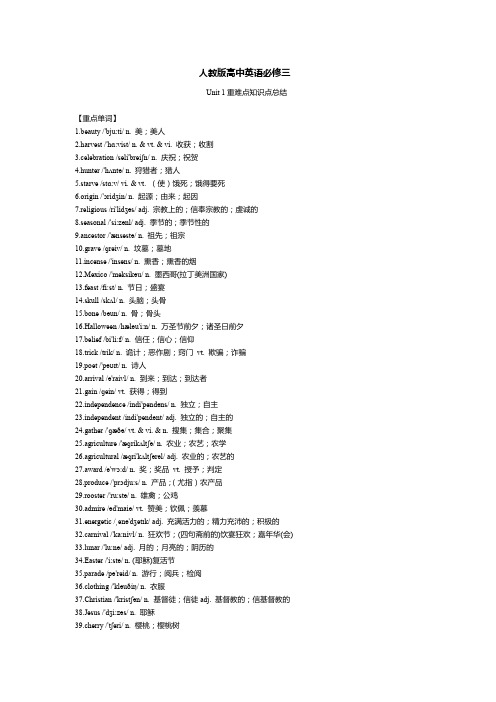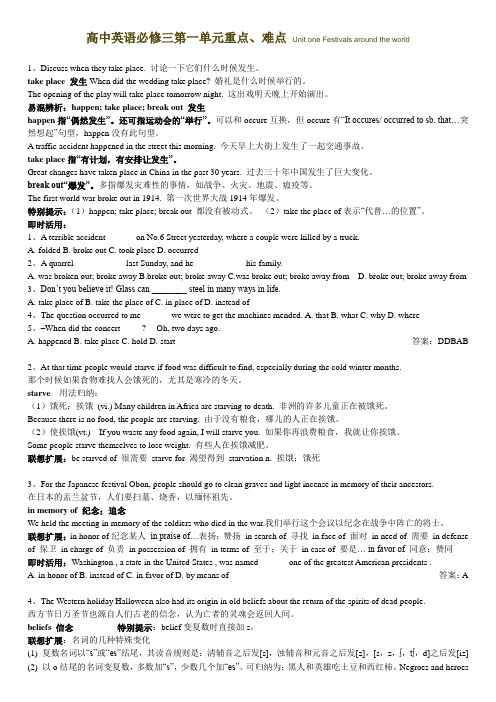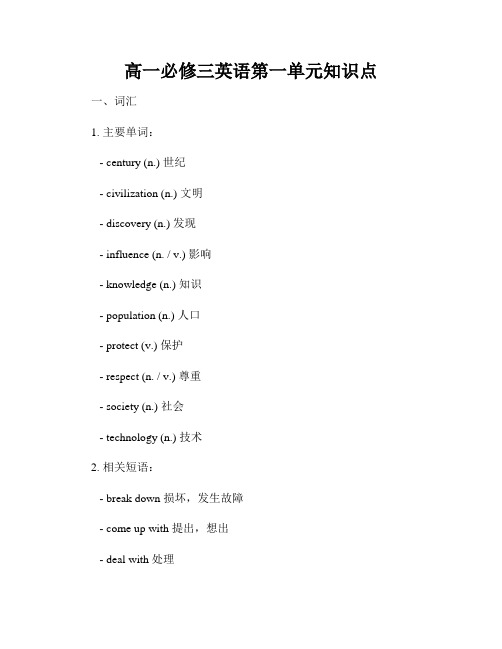高中英语必修三第一单元重点
高一英语必修三知识点:第一单元

第⼀单元 1)starve 作不及物动词,表⽰“饿死,挨饿”。
starve for=be starve of/for,表⽰“渴望获得,迫切得到”。
2)plenty 作不可数名词,只⽤于肯定句中,表⽰“充⾜,⼤量,富裕”,可做主语,宾语或表语。
做主语时,谓语动词随着plenty所指的单复数形式作相应的变化。
plenty也可作副词,表⽰“充分地,⼗⾜地,好多”。
in plenty表⽰“⼤量的,丰富,充裕”可作表语,定语,状语。
3)satisfy 作及物动词,表⽰“满意,使满⾜”,直接跟宾语,若接that从句时,意思是“使相信”,从句前有间接宾语。
satisfy…with以……满⾜ be satisfied with对……满⾜ satisfy…for向……偿还 be satisfied to do sth满⾜于做某事 4)harm 作名词,意为“损害”,不与不定冠词连⽤,常与do,come,mean等动词搭配。
do more harm than good弊⼤于利 There’s no harm in(sb’s)doing sth=It does no harm for sb to do sth做某事⽆害处 作及物动词,表⽰“损害,伤害”。
5)lead 作及物动词,表⽰“领导,引导”其宾语常接介词短语或者副词作宾补。
表⽰“影响,致使”时,后接介词to,也可以接不定式。
lead sb into使某⼈陷⼊某种不良的状态。
lead sb away使盲从,常⽤于被动语态。
lead nowhere毫⽆结果,,对……不起作⽤。
lead up to sth作为……准备,导致。
lead sb by the nose牵着某⼈的⿐⼦,完全操纵某⼈ lead a dog’s life过困难的⽣活 lead sb believe that使某⼈相信(假的事情或不确切的事情) lead the way带路,带头 lead作为名词,give sb a lead给某⼈做出榜样,提⽰某⼈ 6)origin 是名词,表⽰“起源,起因,出⾝”。
人教版高中英语必修三第1单元重点句型及精讲

Module 3 Unit 1 Festivals Aroundthe World1. Festivals are meant to celebrate important times of year.Mean to do 打算Mean doing 意味着I mean what I say. 说话算话。
You are so mean. 卑鄙;吝啬Means 方式By means of ...Be meant to 被用来2. What festivals or celebrations do you have in your city or town?What + n.He knew nothing about what factors were behind these troubles.3. Some festivals are held to honour the dead or to satisfy the ancestors, who might return either to help or to do harm.Do harm to ...Do good to ...Do more good than harm to ... 利大于弊Do more harm than good to ... 弊大于利4. On this important feast day, people eat food in the shape of skulls and cakes with “bones” in them.In the shape ofIn shape 身体健康Shape the world 塑造世界vt5. It is now a children’s festival, when they can dress up and go to their neighbours’ homesto ask for sweets.Dress upDress sb in sthBe dressed in...6. India has a national festival on October 2 to honor Mohandas Gandhi, the leader who helped gain Indi a’s independence from Britain. Changed the Labor from a class party to a national one阶级政党全国性政党名词, + 同位语+定语从句Gain one’s independence from 独立于Be independent of 独立于7. The most energetic and important festivalsare the ones that look forward to the end of winter and to the coming of spring.关系代词在从句中做主语,从句谓动词与先行词保持数的一致。
人教版高中英语必修三Unit 1 重难点知识点总结

人教版高中英语必修三Unit 1重难点知识点总结【重点单词】1.beauty /'bju:ti/ n. 美;美人2.harvest /'hɑ:vist/ n. & vt. & vi. 收获;收割3.celebration /seli'breiʃn/ n. 庆祝;祝贺4.hunter /'hʌntə/ n. 狩猎者;猎人5.starve /stɑ:v/ vi. & vt. (使)饿死;饿得要死6.origin /'ɔridʒin/ n. 起源;由来;起因7.religious /ri'lidʒəs/ adj. 宗教上的;信奉宗教的;虔诚的8.seasonal /'si:zənl/ adj. 季节的;季节性的9.ancestor /'ænsestə/ n. 祖先;祖宗10.grave /ɡreiv/ n. 坟墓;墓地11.incense /'insens/ n. 熏香;熏香的烟12.Mexico /'meksikəu/ n. 墨西哥(拉丁美洲国家)13.feast /fi:st/ n. 节日;盛宴14.skull /skʌl/ n. 头脑;头骨15.bone /bəun/ n. 骨;骨头16.Halloween /hæləu'i:n/ n. 万圣节前夕;诸圣日前夕17.belief /bi'li:f/ n. 信任;信心;信仰18.trick /trik/ n. 诡计;恶作剧;窍门vt. 欺骗;诈骗19.poet /'pəʊɪt/ n. 诗人20.arrival /ə'raivl/ n. 到来;到达;到达者21.gain /ɡein/ vt. 获得;得到22.independence /indi'pendəns/ n. 独立;自主23.independent /indi'pendənt/ adj. 独立的;自主的24.gather /'ɡæðə/ vt. & vi. & n. 搜集;集合;聚集25.agriculture /'æɡrikʌltʃə/ n. 农业;农艺;农学26.agricultural /æɡri'kʌltʃərəl/ adj. 农业的;农艺的27.award /ə'wɔ:d/ n. 奖;奖品vt. 授予;判定28.produce /'prɔdju:s/ n. 产品;(尤指)农产品29.rooster /'ru:stə/ n. 雄禽;公鸡30.admire /əd'maiə/ vt. 赞美;钦佩;羡慕31.energetic /ˌenə'dʒetɪk/ adj. 充满活力的;精力充沛的;积极的32.carnival /'ka:nivl/ n. 狂欢节;(四句斋前的)饮宴狂欢;嘉年华(会)33.lunar /'lu:nə/ adj. 月的;月亮的;阴历的34.Easter /'i:stə/ n. (耶稣)复活节35.parade /pə'reid/ n. 游行;阅兵;检阅36.clothing /'kləuðiŋ/ n. 衣服37.Christian /'kristʃən/ n. 基督徒;信徒adj. 基督教的;信基督教的38.Jesus /'dʒi:zəs/ n. 耶稣39.cherry /'tʃeri/ n. 樱桃;樱桃树40.blossom /'blɔsəm/ n. 花vi. 开花41.custom /'kʌstəm/ n. 习惯;风俗42.worldwide /'wə:ldwaid/ adj. 遍及全世界的;世界性的43.rosebud /'rəuzbʌd/ n. 玫瑰花蕾44.fool /fu:l/ n. 愚人;白痴;受骗者adj. 傻的vt. 愚弄;欺骗vi. 干傻事;开玩笑45.necessity /ni'sesəti/ n. 必要性;需要46.permission /pə'miʃn/ n. 许可;允许47.prediction /pri'dikʃn/ n. 预言;预报;预告48.fashion /'fæʃn/ n. 样子;方式;时尚49.parking /'pɑ:kiŋ/ n. (汽车等)停放50.apologize /ə'pɔlədʒaiz/ vi. 道歉;辩白51.drown /draun/ vt. & vi. 淹没;溺死;淹死52.sadness /'sædnis/ n. 悲哀;悲伤53.obvious /'ɔbviəs/ adj. 明显的;显而易见的54.wipe /waip/ vt. 擦;揩;擦去55.weave /wi:v/ vt. & vi. (wove/wəuv/,woven/'wəuvn/) 编织;(使)迂回前进56.herd /hə:d/ n. 牧群;兽群57.magpie /'mæɡpai/ n. 喜鹊58.weep /wi:p/ vi. (wept, wept) 哭泣;流泪n. 哭;哭泣59.announcer /ə'naunsə/ n. 广播员;告知者;报幕员60.remind /ri'maind/ vt. 提醒;使想起61.forgive /fə'ɡiv/ vt. (forgave /fə'ɡeiv/, forgiven /fə'ɡivn/ )原谅;饶恕【重点短语】1.mean doing sth. 意味着做某事2.mean to do sth. 打算或企图做某事3.be meant for 打算作……用4.take place 发生;举行5.of all kinds 各种各样的6.starve to death饿死7.be starved of 缺乏8.starve for ... / starve to do... 渴望……9.plenty of 大量; 充足10.be satisfied with对……感到满意11.to one’s satisfaction感到满意是12.in the shape of呈……的形状;以……形式13.in memory of sb./ to the memory of sb. 纪念某人14.dress up 穿衣服;打扮;化装15.award sth.(to sb.) 授予(某人)某物16.award sb. sth.(for ...) (因……)授予某人某物17.reward sb. for... 因……奖赏某人18.reward sb. with sth. 用某物酬劳某人19.admire sb. for... 因……钦佩某人20.look forward to期望,期待,盼望21.turn up 出现;把(收音机等)音量开大些22.turn down 拒绝;把(收音机等)音量开小些23.turn off 关掉24.turn on 打开25.turn out 结果是……26.turn to sb. for help 向某人求助27.keep one’s word 守信28.break one’s word 失信【重点句型】1.Please make sure when and where the accident took place.请查清楚事故是何时何地发生的。
高中英语必修三第一单元重点

高中英语必修三第一单元重点、难点Unit one Festivals around the world1、Discuss when they take place. 讨论一下它们什么时候发生。
take place 发生When did the wedding take place? 婚礼是什么时候举行的。
The opening of the play will take place tomorrow night. 这出戏明天晚上开始演出。
易混辨析:happen; take place; break out 发生happen指“偶然发生”。
还可指运动会的“举行”。
可以和occure互换,但occure有“It occures/ occurred to sb. that…突然想起”句型,happen没有此句型。
A traffic accident happened in the street this morning. 今天早上大街上发生了一起交通事故。
take place指“有计划,有安排让发生”。
Great changes have taken place in China in the past 30 years. 过去三十年中国发生了巨大变化。
break out“爆发”。
多指爆发灾难性的事情,如战争、火灾、地震、瘟疫等。
The first world war broke out in 1914. 第一次世界大战1914年爆发。
特别提示:(1)happen; take place; break out 都没有被动式。
(2)take the place of表示“代替…的位置”。
即时活用:1、A terrible accident ______ on No.6 Street yesterday, where a couple were killed by a truck.A. foldedB. broke outC. took placeD. occurred2、A quarrel ___________ last Sunday, and he ___________ his family.A. was broken out; broke awayB.broke out; broke awayC.was broke out; broke away fromD. broke out; broke away from3、Don’t you believe it! Glass can ________ steel in many ways in life.A. take place ofB. take the place ofC. in place ofD. instead of4、The question occurred to me ______ we were to get the machines mended. A. that B. what C. why D. where5、–When did the concert_____? ---Oh, two days ago.A. happenedB. take placeC. holdD. start 答案:DDBAB2、At that time people would starve if food was difficult to find, especially during the cold winter months.那个时候如果食物难找人会饿死的,尤其是寒冷的冬天。
必修三unit1重点短语及句式

必修3 Unit1 Festivals around the world 语言点1.(1)take place : 发生,举行(按意图,计划,发生)(2)happen: 发生(意外和偶然性)(3)occur : 发生,突然想起(意外和预料中)句型:sth occurs to sb= it occurs to sb that 某人突然想起某事(4)break out : 爆发,发生(战争,灾害,争吵,争论)(5)come about : 发生(指事情已经发生了,但还不知道为什么. 解释或说明事情的缘由,常与how 连用用于疑问或否定句)2.(1)in memory of 纪念(2) in place of 代替(3) in search of 寻找(4) in charge of 负责,管理(5) in favor of 支持(6) in face of 面对(7) in the hope of 怀着....的希望(8) in control of 控制(9) in praise of 歌颂(10) in possession of 拥有(11)in honor of 纪念,对...表敬意3.(1) dress up 盛装,打扮,掩饰(2) dress sb /oneself给某人/自己穿衣服(3)be dressed in 穿着... wear+衣服be on+衣服put on+衣服4. (1) play a trick on =play tricks on 搞恶作剧,开玩笑,戏弄某人(2) play a joke on =play jokes on 开玩笑,戏弄某人(3) make a joke 讲笑话(4) have a joke with sb 和某人开玩笑(5) make fun of sb 取笑,嘲笑某人(6) laugh at sb嘲笑某人(7) make a fool of sb 愚弄某人5. 词语辨析:(1)gain 获得,得到(好处,利益,经验)(2)win 赢(比赛,战争,人)(3) earn 挣,赚(金钱,荣誉)(1)gather :将分散的集中在一起(2) collect : 有计划,选择地精心收集(1)award 指正式地或官方地颁发,授予,给予。
高中英语人教版必修三unit1单词,短语,重点句型梳理

Unit 1单词、短语、重点句型梳理重点单词arrival【课文原句】In the USA, Columbus Day is in memory of the arrival of Christopher Columbus in the New World. (Page 2)【点拨】arrival n. 意为"到来;到达"。
如:Mary’s sudden arrival brought us a big surprise.【拓展】★arrival所构成的常用搭配有:on /upon arrival一到达就……;thearrival of……的到来;early / late /new arrival早到/晚到/新来的人。
如:Guests will receive dinner on / upon arrival at the hotel.The arrival of winter can make many people upset.New arrivals were greeted with a warm welcome.★名词arrival是由动词arrive加后缀"-al"构成的。
"-al"在此作名词后缀。
像这样构成的名词还有:refusal (= refuse +后缀"-al") 拒绝;survival (= survive +后缀"-al") 幸存。
【小试牛刀】根据中文提示,用arrival所构成搭配的适当形式完成下列句子。
1. 来晚的人不允许进入剧院。
____________ will not be admitted to the theatre.2. 在这张表格上,你可以标明你希望在你到达的时候有助教去接你。
On the form you may mark that you want a tutor to pick you up __________.3. 自从手机问世以来,电话号码的需求量正在迅速增长。
高一必修三英语第一单元知识点

高一必修三英语第一单元知识点一、词汇1. 主要单词:- century (n.) 世纪- civilization (n.) 文明- discovery (n.) 发现- influence (n. / v.) 影响- knowledge (n.) 知识- population (n.) 人口- protect (v.) 保护- respect (n. / v.) 尊重- society (n.) 社会- technology (n.) 技术2. 相关短语:- break down 损坏,发生故障- come up with 提出,想出- deal with 处理- find out 发现,查明- look forward to 期待- make up 编造,弥补- play a role 起作用- take part in 参加- turn to 求助于二、语法1. 一般现在时:表示客观事实、日常习惯等。
- 例句:The sun rises in the east.- 例句:I usually have breakfast at 7 am.2. 时间状语从句:使用when、while、before、after等引导的从句。
- 例句:I will call you after I finish my homework.- 例句:She always listens to music while she is doing homework.3. 直接引语和间接引语:将别人的话转述为间接引语时,需要注意时态和人称的变化。
- 直接引语:He said, "I am going to the park."间接引语:He said that he was going to the park.4. 及物动词和不及物动词:不及物动词后面不接宾语,而及物动词需要接宾语。
- 例句:He plays basketball very well. (及物动词)- 例句:She runs every morning. (不及物动词)三、阅读理解1. 主旨大意题:通过阅读全文,理解文章的主要观点或中心思想。
人教版高中英语必修三Unit1重点词汇

运用 用上述短语完成下列句子。
⑴ The Dragon Boat Festival was set _in__m__e_m_o_r_y__o_f_ Qu Yuan who contributed all his ambition to his country.
⑵ The couple gave a dinner
⑵ 请接受我诚意的(sincere)道歉。 Please accept my sincere apology.
8. obvious adj. 明显的; 显而易见的 (clear; easily seen, recognized or understood)
例句 It was obvious that the manager of the coffee shop was waiting for Li Fang to leave.显然,咖啡馆的经理在等 李方离开。(=Obviously, the manager…)
例句 On Independence Day, people in America dress up to attract others’ attention. 在独立日, 美国民众穿上盛 装来吸引别人的注意。
联想 dress up+ as+ n.打扮成…… dress sb/oneself. 给……穿衣服 be dressed in+衣物/颜色穿着…
⑶ _O_b_v_i_o_u_s_ly__(obvious), he needs help.
9. take place 发生, 举行(常指事先安排 或计划的事情)
原句 Discuss when they take place, what they celebrate and what people do at that time.讨论它们(中国节日)是什么 时候举行, 庆祝什么, 人们在那天做什么。 (B3 P1)
- 1、下载文档前请自行甄别文档内容的完整性,平台不提供额外的编辑、内容补充、找答案等附加服务。
- 2、"仅部分预览"的文档,不可在线预览部分如存在完整性等问题,可反馈申请退款(可完整预览的文档不适用该条件!)。
- 3、如文档侵犯您的权益,请联系客服反馈,我们会尽快为您处理(人工客服工作时间:9:00-18:30)。
高中英语必修三第一单元重点、难点Unit one Festivals around the world1、Discuss when they take place. 讨论一下它们什么时候发生。
take place 发生When did the wedding take place? 婚礼是什么时候举行的。
The opening of the play will take place tomorrow night. 这出戏明天晚上开始演出。
易混辨析:happen; take place; break out 发生happen指“偶然发生”。
还可指运动会的“举行”。
可以和occure互换,但occure有“It occures/ occurred to sb. that…突然想起”句型,happen没有此句型。
A traffic accident happened in the street this morning. 今天早上大街上发生了一起交通事故。
take place指“有计划,有安排让发生”。
Great changes have taken place in China in the past 30 years. 过去三十年中国发生了巨大变化。
break out“爆发”。
多指爆发灾难性的事情,如战争、火灾、地震、瘟疫等。
The first world war broke out in 1914. 第一次世界大战1914年爆发。
特别提示:(1)happen; take place; break out 都没有被动式。
(2)take the place of表示“代替…的位置”。
即时活用:1、A terrible accident ______ on No.6 Street yesterday, where a couple were killed by a truck.A. foldedB. broke outC. took placeD. occurred2、A quarrel ___________ last Sunday, and he ___________ his family.A. was broken out; broke awayB.broke out; broke awayC.was broke out; broke away fromD. broke out; broke away from3、Don’t you believe it! Glass can ________ steel in many ways in life.A. take place ofB. take the place ofC. in place ofD. instead of4、The question occurred to me ______ we were to get the machines mended. A. that B. what C. why D. where5、–When did the concert_____? ---Oh, two days ago.A. happenedB. take placeC. holdD. start 答案:DDBAB2、At that time people would starve if food was difficult to find, especially during the cold winter months.那个时候如果食物难找人会饿死的,尤其是寒冷的冬天。
starve 用法归纳:(1)饿死;挨饿(vi.) Many children in Africa are starving to death. 非洲的许多儿童正在被饿死。
Because there is no food, the people are starving. 由于没有粮食,哪儿的人正在挨饿。
(2)使挨饿(vt.) If you waste any food again, I will starve you. 如果你再浪费粮食,我就让你挨饿。
Some people starve themselves to lose weight. 有些人在挨饿减肥。
联想扩展:be starved of 很需要starve for 渴望得到starvation n. 挨饿;饿死3、For the Japanese festival Obon, people should go to clean graves and light incense in memory of their ancestors.在日本的盂兰盆节,人们要扫墓、烧香,以缅怀祖先。
in memory of 纪念;追念We held the meeting in memory of the soldiers who died in the war.我们举行这个会议以纪念在战争中阵亡的将士。
联想扩展:in honor of纪念某人in praise of…表扬;赞扬in search of 寻找in face of 面对in need of 需要in defense of 保卫in charge of 负责in possession of 拥有in terms of 至于;关于in case of 要是… in favor of 同意;赞同即时活用:Washington , a state in the United States , was named ______ one of the greatest American presidents .A. in honor ofB. instead ofC. in favor ofD. by means of 答案:A4、The Western holiday Halloween also had its origin in old beliefs about the return of the spirits of dead people.西方节日万圣节也源自人们古老的信念,认为亡者的灵魂会返回人间。
beliefs 信念特别提示:belief变复数时直接加s。
联想扩展:名词的几种特殊变化(1) 复数名词以“s”或“es”结尾,其读音规则是:清辅音之后发[s],浊辅音和元音之后发[z],[s,z,∫,t∫,d]之后发[iz](2) 以o结尾的名词变复数,多数加“s”,少数几个加“es”。
可归纳为:黑人和英雄吃土豆和西红柿。
Negroes and heroes eat potatoes and tomatoes.(3) 以th. 结尾的名词加“s”后,th.发生音变的有:一个青年去洗澡,回来路上撇着嘴。
即“youth”,“bath”,“path”,“mouth”这四个词发生音变,其它th.结尾的名词加s变为复数时th.不发生音变。
(4) 以f结尾的名词变复数时大都变f为ves,但有几个直接加s变为复数。
可归纳为:一个农奴(serf)从海湾(gulf)来到房顶(roof)上,找到首长(chief),有了证据(proof),增加了信仰(belief)。
(5) 名词修饰名词,除man和woman随后边的名词的单复数变化外,其余名词一律用单数。
可以归纳为:所有名词都用单(数),男人女人随名词变化。
即时活用:– Where are you going to do your shopping? --- I am going to the _________.A. shoe’sB. shoe storeC. shoes storeD. shoes’ store答案:B5、It is now a children’s festival, when they can dress up and go to their neighbor’s homes to ask for sweets.现在成了一个儿童节日,节日期间孩子们打扮起来,去邻居家要糖果。
dress up用法归纳:(1)打扮成某种样子;穿上最好的衣服(2)The dress up as Father Cristmas during Cristmas. 圣诞节期间他们打扮成圣诞老人。
It’s only an informal party, you needn’t dress up. 只是个非正式的聚会,你没必要打扮。
(2)把…打扮起来Would you please dress the children up? 能把孩子们打扮一下吗?Why are you dressed up? 为什么要打扮?6、If the neighbors do not give any sweets, the children might play a trick on them.如果邻居们不给他们糖果,孩子们就会作弄他们。
play a trick on sb. 开玩笑;欺骗It is acceptable to play tricks on your friends on April 1st. 在愚人节那天作弄朋友是可以接受的。
联想扩展:take…into…坑人trick sb. out of 骗取play a joke on sb. 戏弄某人have a joke 说笑话make a joke about sb. or sth.. 拿某人或某事说笑话laugh at sb.嘲笑某人make fun of sb. 取笑某人7、Some people might win awards for their farm produce, like the biggest watermelon or the most handsome rooster.由于他们的农产品,如最大的西瓜,或者最漂亮的公鸡,有些人会得到奖励的。
award n.奖;奖品v.授予;判定He won first award of talking big competition. 他在演讲大赛中获得了第一名。
The school awarded Mary a prize for her good work. 由于她优秀的工作学校给玛丽发奖。
易混辨析:award , prize , reward 奖award “奖,奖品”。
对于优异成绩获卓越贡献经过评定后正式授予的奖励。
奖励可以是精神的,也可以是物质的。
其获得这并不一定参加某种竞赛,但其成绩却达到获奖水平。
prize “奖赏,奖品”。
确认某人在竞赛中取得优异成绩并给与特殊奖励。
含有优胜者几经拼搏,胜利来之不易的意思。
